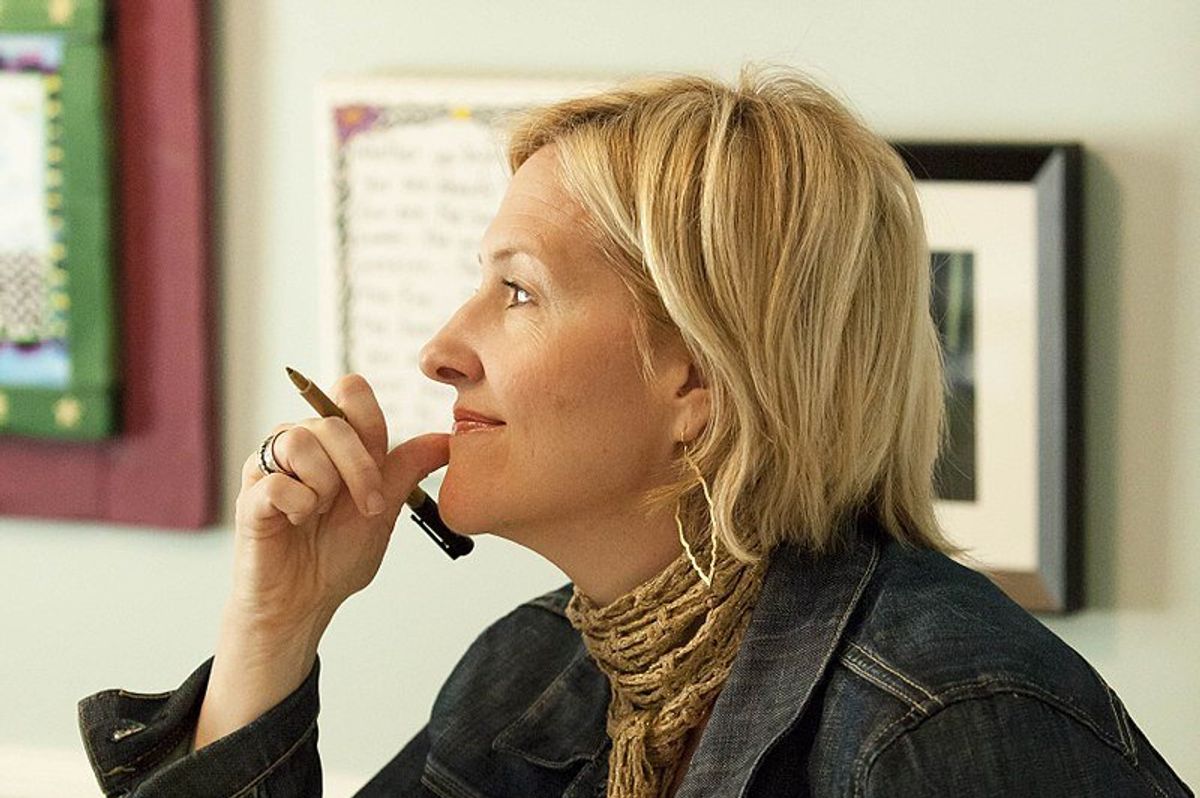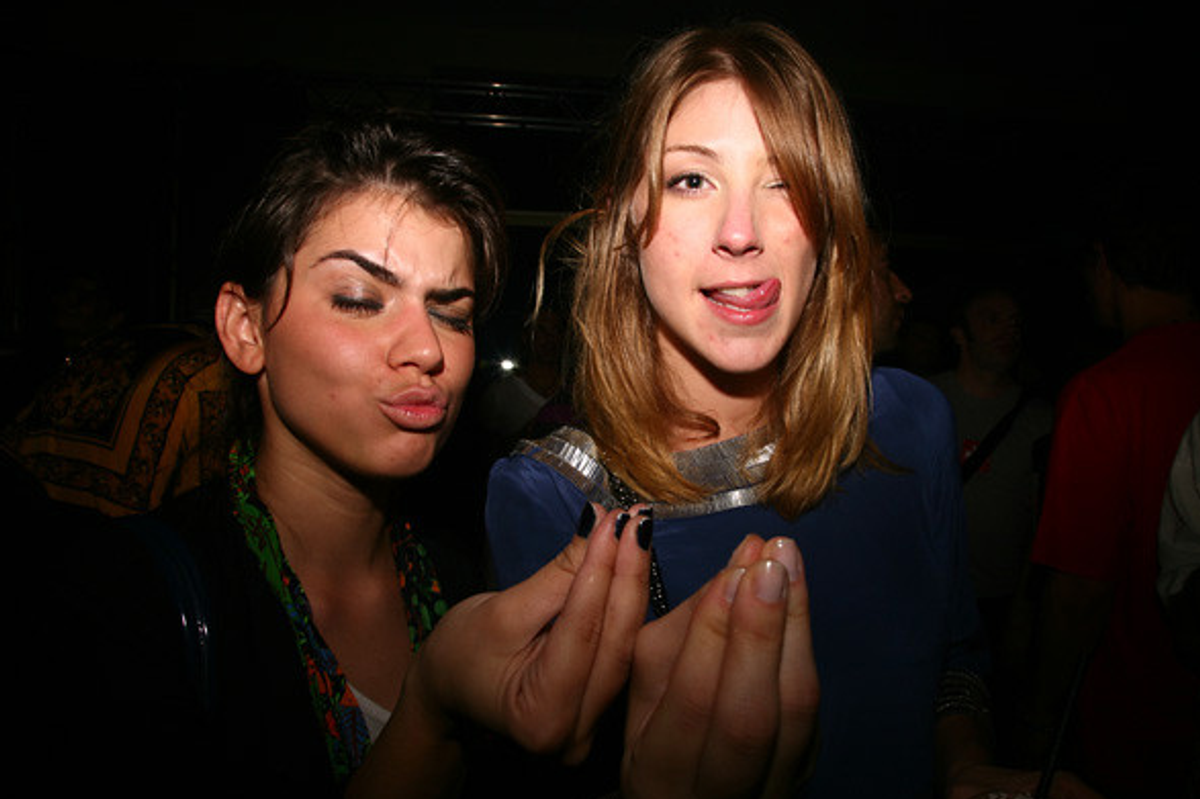There's something incredibly satisfying about knowing the right time to leave a party. You felt the vibe was about to shift in the wrong direction, so you grabbed your coat, said some goodbyes, and hit the door. Then, when you hear the next day that the couple who hosted the party got into a big argument that brought everything to a halt, you can be proud you called it.
Knowing when to bail means making sure you don't have to console somebody who got into a disagreement with their significant other, talk to the cops, or sit through someone picking up an acoustic guitar and playing bad Nirvana covers.
 A guy playing guitar at a party. via AG Gilmore/Flickr
A guy playing guitar at a party. via AG Gilmore/Flickr
Becoming a trained professional in the world of partying doesn't just happen overnight; it comes from years of experience honing a keen social Spidey sense. The folks on Reddit came together to share the signs it's time to leave a party, hoping to protect younger people from making the same mistakes they did.
The answers fall into two lanes: the first focuses on recognizing when the host wants to wind things down, and the second on signs the party is about to go sideways.
15 signs that it's time to leave the party
1. Leave before round 2
"When that one guy who got drunk first and had to be airlifted into a bed to come to his senses at the beginning of the party gets up and is ready for round two. Time to go, you do not want to see round two."
"You absolutely do want to see round two, just from the safety of your own place, the next day, laughing at the photos people took."
2. Take the "well" clue
"Host puts their hands on their knees, stands up and says 'Well, it's getting late.'"
"Slap the knees and say 'right' is the British way."
3. Host cleans, you leave
"If the host starts cleaning up instead of socializing, it's either time to help or time to leave."
"A friend of mine would regularly stop the music, yell '10 second tidy!' and everyone would just start picking up bottles and stuff and clean up. It was always quite fun and somehow never a buzz kill."
4. The first drunk cry
"When that one girl starts drunk-crying and making a scene for nothing."
"Since everyone is sharing stories; I used to work in hotels and we would often have parties at someone's house after shifts. There was one girl in particular who was sweet as pie and super shy when sober, but when drunk, she turned into an absolute mess. After she got drunk, started crying and then locked herself in the bathroom for multiple hours, two parties in a row, we stopped inviting her."
"I see you've met my brother's wife. There is always a moment at family gatherings when she starts her sh*t, my husband and I look at each other and announce we are leaving. Staying never ends well."
Why is it that some people get extra happy when they drink, while others get depressed? Researchers aren't sure of the exact reason, but polls show that around 2% of people regularly cry when they drink alcohol. Scientists suggest that drinking may increase some people's stress response, which can leave them crying in their beer.
 Argument at a backyard party.via Canva/Photos
Argument at a backyard party.via Canva/Photos
5. When the dog gets nervous
"This is for real. If the dog's trying to deuce out, I'm gone too."
"This is the one. The dogs know what's coming."
6. If the host yawns
"When the hosts yawn, leave. If the hosts don't yawn, leave by the time half the guest have. Don't stay until the end unless it's your best friend."
"Yeah, basically just observe the hosts. It's not always a yawn. Sometimes they go into this thousand-yard stare, sometimes they excuse themselves and start cleaning up, sometimes they just start looking at their phone or watch a bit more than usual."
7. Weird dudes roll up
"A group of males that no one really knows show up."
"This happened at a house party I was at once. The host was a female and asked who they came with, and they just stared at her and left the room and went to the backyard. It was so creepy. It was 5 or 6 guys and absolutely no one at the party knew them. She ended up calling the police because she was scared to tell them to leave."
 People hanging out at a house party.via Canva/Photos
People hanging out at a house party.via Canva/Photos
8. When the phones come out
"In my experience, when someone shares a YouTube video they're excited about. The video is fine, but it inevitably leads to 'Oh, that reminds me of one I saw!' leading to an unending chain of people sharing videos, most of the group bored at any given one. The party is over, now its just people watching Youtube. Bail."
"Underrated answer. I looooathe the end of night YouTube loop."
9. Trust your gut
"As soon as your gut tells you to leave. Don't let anyone convince you to stay if you have that feeling."
10. It depends on your age
"In your teens: any vomiting.
In your 20s: it's just you and the host's closest friends, and everyone left there is a closer friend than you.
In your 30s: the babysitter needs to get home.
In your 40s: no one needs encouragement. Our pajamas start calling us immediately after dinner."
11. Leave by midnight
"Been a bartender for several several years. NOTHING good happens after midnight. It's just drunk people and the people trying to take advantage of them."
 A woman who slept on the floor.via Canva/Photos
A woman who slept on the floor.via Canva/Photos
12. When it moves to the front lawn
"When the party spills outside the house cause the cops are coming."
"The first time a neighbor complains. They may have already called the cops."
13. When the "Grease Megamix" comes on
"I always left office Christmas parties when the DJ played Grease Megamix. After 20 years in the industry, I deduced that this was a distinctive sign that everything was going to go downhill rapidly from that point. My advice to young people when hearing Grease Megamix at a company party:
Put down your drink.
Get your coat.
Vacate the premises using the nearest exit in a calm and ordinary manner."
"The only time i've heard the Grease Megamix in the wild was at a wedding in the middle of nowhere, and sh*t got weird soon after. fighting, crying, screaming, throwing things—mostly by the couple's relatives, all of them over 50. you're absolutely right, it always goes downhill after the megamix."
- YouTube www.youtube.com
14. When the badmouthing begins
"When everyone just starts bad mouthing each other and no one is actually socializing lol. like what's the point?"
15. If you're the only woman there
"As a woman?? You show up and you're either the only girl there or one of the only girls there...you won't be having a good time."




 Teens hanging out in a living room.via
Teens hanging out in a living room.via  Teenagers eating pizza.via
Teenagers eating pizza.via  Teenagers eating pizza.via
Teenagers eating pizza.via 
 A guy playing guitar at a party. via
A guy playing guitar at a party. via  Argument at a backyard party.via
Argument at a backyard party.via  People hanging out at a house party.via
People hanging out at a house party.via  A woman who slept on the floor.via
A woman who slept on the floor.via 

